
Ruling says arbitrator should be first to answer questions on his jurisdiction

The Ontario Superior Court of Justice has declined to issue an injunction to prevent an arbitrator from hearing and deciding a challenge to his jurisdiction until the court’s determination of a cross-motion to set aside the arbitration agreement.
In Fredericks v. South Western Insurance Group Limited, 2025 ONSC 4637, the parties signed a share purchase agreement containing an arbitration agreement.
Under the share purchase agreement, the plaintiffs sold the defendant two corporations for $40 million. The transaction closed in January 2024.
The defendant alleged that the plaintiffs had breached warranties and representations in the share purchase agreement. In October 2024, the parties jointly retained Frank Newbould to arbitrate their dispute under the share purchase agreement.
The arbitration initially went smoothly. However, in December 2024, the plaintiffs discharged their then-counsel and retained new counsel. In the arbitration, the plaintiffs moved to challenge Newbould’s jurisdiction. This motion was set for hearing on Aug. 25.
Before the Superior Court, the plaintiffs brought the present action against the defendant and Newbould. The plaintiffs requested orders:
The defendant moved to stay this action under s. 7(1) of Ontario’s Arbitration Act, 1991. The plaintiffs filed a cross-motion to set aside the arbitration agreement. The court scheduled a hearing of the motion and cross-motion on Dec. 4.
On July 14, the plaintiffs moved for an injunction to prevent Newbould from hearing and deciding their motion assailing his jurisdiction until the court dealt with their cross-motion to set aside the arbitration agreement.
The plaintiffs raised the question of whether the court or the arbitrator should be the first to consider whether the defendant’s claims fell within the share purchase agreement’s arbitration provisions.
The Ontario Superior Court of Justice has dismissed the motion for an injunction and refused to issue extraordinary relief to interfere with the ongoing arbitration.
The court ruled that the plaintiffs failed to meet the first two stages of the test in RJR — MacDonald Inc. v. Canada (Attorney General), 1994 CanLII 117 (SCC), [1994] 1 S.C.R. 311. Thus, the court saw no reason to consider the third step, the balance of convenience.
First, the court held that the plaintiffs failed to raise a serious question for trial or cite case law supporting their position that the court should intervene in this arbitration at this point. The court said the language of the share purchase agreement or the dispute resolution provisions did not call for its interference at this time.
The court determined that Newbould should first answer any questions regarding his own jurisdiction without the court’s involvement.
The court pointed out that the parties chose to bring their dispute before an arbitrator. The decision noted that courts would generally defer to arbitrators and their work to respect the parties’ choices and reflect the Legislature’s decision, per the Arbitration Act’s provisions, to protect arbitrators’ right to determine their own jurisdiction.
Second, the court found that the plaintiffs failed to establish that denying the injunction would irreparably harm them and failed to identify any harm that damages or a cost award could compensate.
According to the court, even without an injunction, Newbould would soon rule on the plaintiffs’ challenge to his jurisdiction and could address the arguments the parties wanted to make.
The court noted that, depending on the motion's outcome before Newbould, the parties could avail themselves of remedies under the Arbitration Act and their arbitration agreement’s terms.
The court rejected the plaintiffs’ allegation of irreparable harm arising from the multiplicity of proceedings before the Superior Court and the arbitrator.
The court saw no irreparable harm because the Arbitration Act contemplated situations where an arbitration and an action would proceed in parallel. The court also called any multiplicity of proceedings a problem of the plaintiffs’ own making.